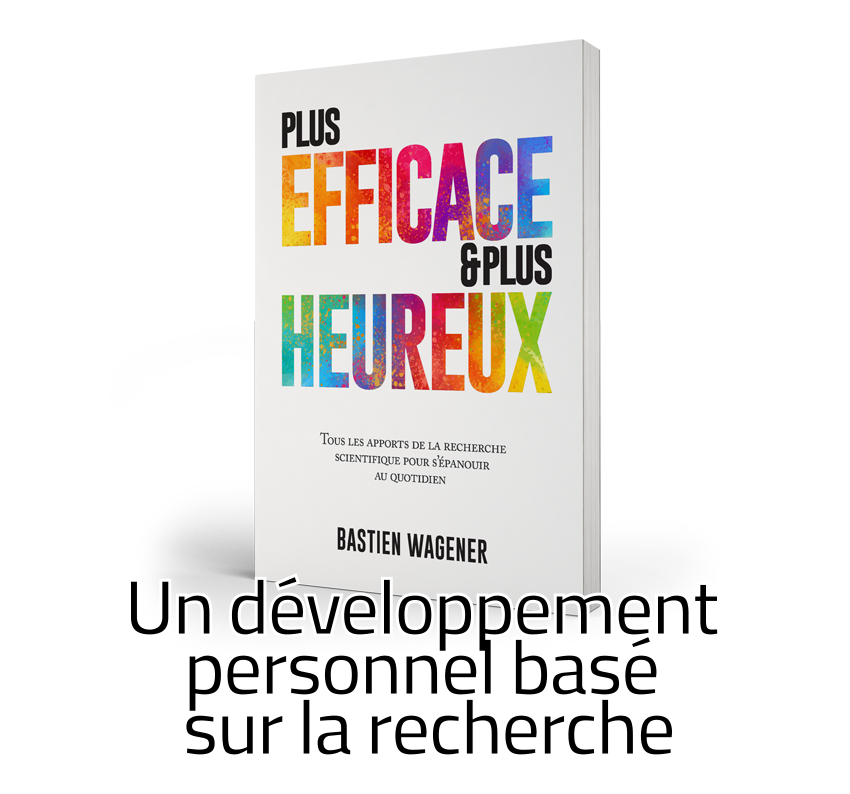Les travaux de recherche en psychologie positive se diffusent de plus en plus dans le monde francophone depuis quelques années. Et pourtant, la discipline reste encore assez méconnue, ce qui amène régulièrement la presse ou certains auteurs à diffuser des contre-sens sur le sujet. Non, la psychologie positive n’a pas pour vocation d’ignorer le négatif ou de promouvoir un bonheur illusoire de tous les instants. La réalité est bien plus complexe et intéressante que cela !
C’est pourquoi je vous propose aujourd’hui d’en découvrir un peu plus sur les origines de cette discipline, ses grands points de focalisation et les outils pratiques qui en sont issus. Si vous souhaitez mieux comprendre la psychologie positive, je vous invite donc à écouter cet épisode du podcast !
Où écouter le podcast ?
Si vous avez aimé cet épisode et que vous voulez être notifié(e) quand le prochain sera mis en ligne, rendez vous sur Youtube, iTunes, Google Podcasts, Deezer, Spotify, TuneIn et à vous abonner.
Et enfin, si vous souhaitez soutenir ce podcast, je vous invite à l’évaluer sur iTunes, cela aide beaucoup à lui donner de la visibilité.
Mentionné dans l’émission
- Le questionnaire orientation vers le bonheur
- Épisode du podcast sur les forces de caractère
- Le questionnaire gratuit des forces de caractère
- Le guide des forces en version papier ou au format pdf
- L’article sur la pratique délibérée
- Épisode du podcast sur le bonheur
Pour aller plus loin
- Mon livre de psychologie positive “Plus Efficace & Plus Heureux“
- Un questionnaire scientifique pour mesurer votre niveau de gratitude
- L’exercice des 3 choses positives par jour
- L’exercice de la positivité en boîte
- Mieux comprendre la notion de flow (expérience optimale)
Qu’avez vous pensé de cet épisode ? Quelque chose à ajouter ou à partager ? Dites-le moi en commentaire !
Références
- Aknin, L. B., Barrington-Leigh, C. P., Dunn, E. W., Helliwell, J. F., Burns, J., Biswas-Diener, R., Kemeza, I., Nyende, P., Ashton-James, C. E., & Norton, M. I. (2013). Prosocial spending and well-being : Cross-cultural evidence for a psychological universal. Journal of Personality and Social Psychology, 104(4), 635‑652.
- Anderson, J. R. (2015). Cognitive psychology and its implications (Eighth edition). Worth Publishers.
- Chase, W. G., & Simon, H. A. (1973). Perception in chess. Cognitive Psychology, 4(1), 55‑81.
Csíkszentmihályi, M. (2012). Vivre : La psychologie du bonheur. - Diener, E., Suh, E. M., Lucas, R. E., & Smith, H. L. (1999). Subjective well-being : Three decades of progress. Psychological Bulletin, 125(2), 276‑302.
- Emmons, R. A., & McCullough, M. E. (2003). Counting blessings versus burdens : An experimental investigation of gratitude and subjective well-being in daily life. Journal of Personality and Social Psychology, 84(2), 377‑389.
- Ericsson, K. A., Krampe, R. T., & Tesch-Römer, C. (1993). The role of deliberate practice in the acquisition of expert performance. Psychological Review, 100(3), 363‑406.
- Fülöp, M. (2009). Happy and Unhappy Competitors : What Makes the Difference? Psychological Topics, 18(2), 345‑367.
- Gable, S., L., & Haidt, J. (2011). Qu’est-ce que la psychologie positive (et pourquoi) ? In C. Martin-Krumm & C. Tarquinio (Éds.), Traité de psychologie positive (p. 29‑40). De Boeck.
- Kahneman, D., Krueger, A. B., Schkade, D. A., Schwarz, N., & Stone, A. A. (2004). A Survey Method for Characterizing Daily Life Experience : The Day Reconstruction Method. Science, 306(5702), 1776‑1780.
- Lyubomirsky, S., & Ross, L. (1997). Hedonic consequences of social comparison : A contrast of happy and unhappy people. Journal of Personality and Social Psychology, 73(6), 1141‑1157.
- Lyubomirsky, S., Sheldon, K. M., & Schkade, D. (2005). Pursuing Happiness : The Architecture of Sustainable Change. Review of General Psychology, 9(2), 111‑131.
- Magen, Z., & Aharoni, R. (1991). Adolescents’ Contributing toward Others : Relationship to Positive Experiences and Transpersonal Commitment. Journal of Humanistic Psychology, 31(2), 126‑143.
- Martin-Krumm, C., Kern, L., Fontayne, P., Romo, L., Boudoukha, A. H., & Boniwell, I. (2015). French Adaptation of the Orientation to Happiness Scale and Its Relationship to Quality of Life in French Students. Social Indicators Research, 124(1), 259‑281.
- Okun, M. A., Stock, W. A., Haring, M. J., & Witter, R. A. (1984). The Social Activity/Subjective Well-Being Relation : A Quantitative Synthesis. Research on Aging, 6(1), 45‑65.
- Olsson, C. A., McGee, R., Nada-Raja, S., & Williams, S. M. (2013). A 32-Year Longitudinal Study of Child and Adolescent Pathways to Well-Being in Adulthood. Journal of Happiness Studies, 14(3), 1069‑1083.
- Putnam, R. D. (2001). Bowling alone : The collapse and revival of American community (1. touchstone ed). Simon & Schuster.
- Ransford, H. E., & Palisi, B. J. (1996). Aerobic exercise, subjective health and psychological well-being within age and gender subgroups. Social Science & Medicine, 42(11), 1555‑1559.
- Rohrer, J. M., Richter, D., Brümmer, M., Wagner, G. G., & Schmukle, S. C. (2018). Successfully Striving for Happiness : Socially Engaged Pursuits Predict Increases in Life Satisfaction. Psychological Science, 29(8), 1291‑1298.
- Sheldon, K. M., Deci, E. L., & Ryan, R. M. (2002). The self-concordance model of healthy goal-striving : When personal goals correctly represent the person. In Handbook of self-determination research (p. 65‑86). University of Rochester Press.
Sheldon, K. M., & Houser-Marko, L. (2001). Self-concordance, goal attainment, and the pursuit of happiness : Can there be an upward spiral? Journal of Personality and Social Psychology, 80(1), 152‑165. - Sheldon, K. M., & Lyubomirsky, S. (2012). Achieving Sustainable New Happiness : Prospects, Practices, and Prescriptions. In P. A. Linley & S. Joseph (Éds.), Positive Psychology in Practice (p. 127‑145). John Wiley & Sons, Inc.
- Snyder, C. R., Lopez, S. J., & Pedrotti, J. T. (2011). Positive psychology : The scientific and practical explorations of human strengths (2nd ed). SAGE.
- Snyder, M., & Omoto, A. M. (2000). Basic Research and Practical Problems : Volunteerism and the Psychology of Individual and Collective Action. In W. Wosinska, R. B. Cialdini, D. W. Barrett, & J. Reykowski (Éds.), The Practice of Social influence in Multiple Cultures (Psychology Press, p. 287‑307).
- Trottier, C., Mageau, G., Trudel, P., & Halliwell, W. R. (2008). Validation de la version canadienne-française du Life Orientation Test-Revised. Canadian Journal of Behavioural Science / Revue Canadienne Des Sciences Du Comportement, 40(4), 238‑243.
- Warneken, F., & Tomasello, M. (2009). The roots of human altruism. British Journal of Psychology, 100(3), 455‑471.
Retrouvez la page consacrée au podcast ici : le podcast se réaliser
Mais aussi toutes les notes et précisions pour chaque épisode en suivant ce lien : pages des épisodes






Merci d’être passé(e) sur le site et d’avoir pris le temps de lire cet article ! J’espère que vous l’avez apprécié.
N’hésitez pas à me laisser un commentaire ci-dessous si vous avez des questions ou des remarques. Je fais de mon mieux pour lire et répondre à tous les commentaires postés sur le blog, alors ne soyez pas timide !
Et si vous appréciez le contenu proposé sur se-realiser.com, vous pouvez vous inscrire à notre newsletter (formulaire d’inscription dans la colonne de droite) pour rester au courant de toutes les actualités du site (pas de spam, pas de revente d’informations, rassurez-vous !).